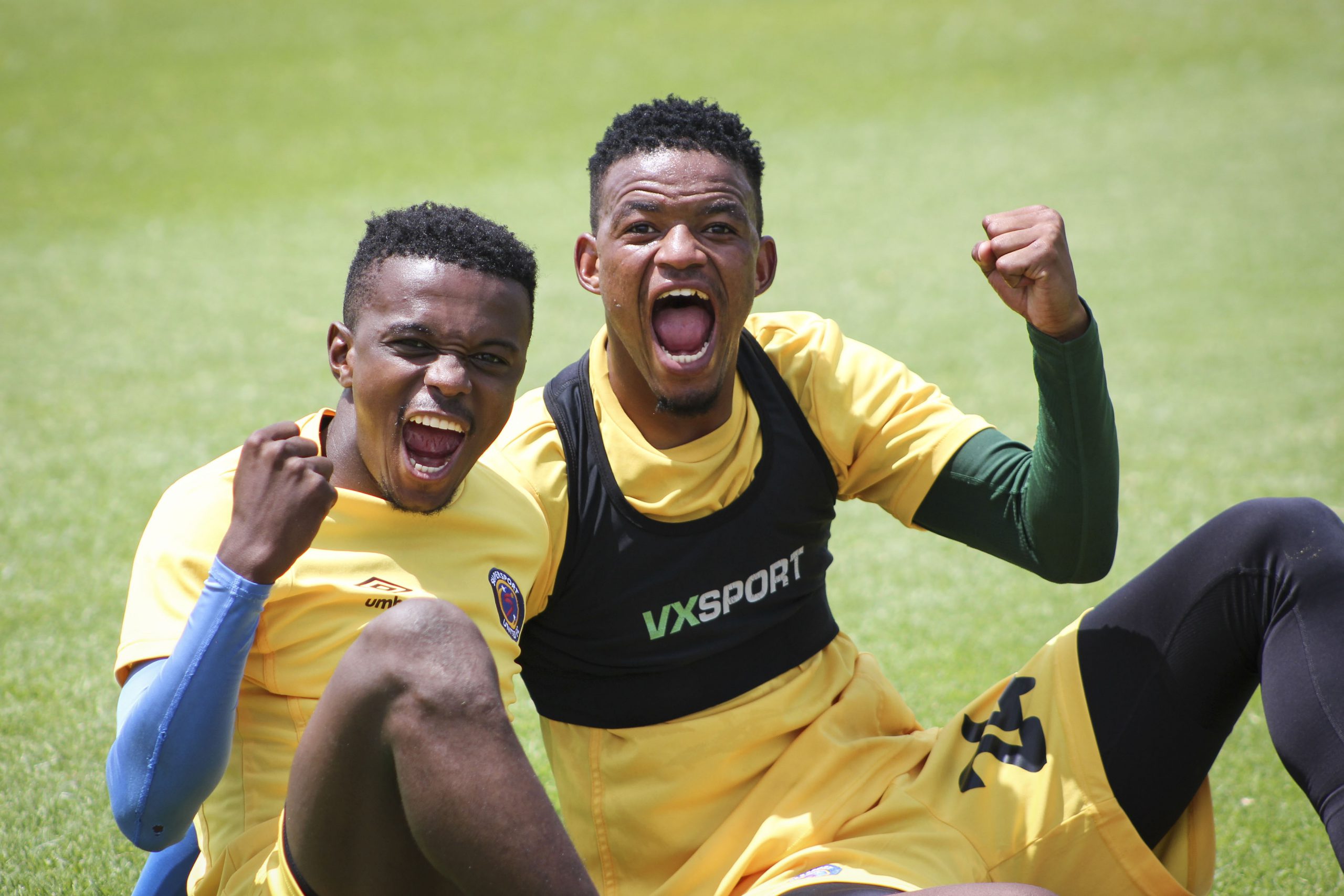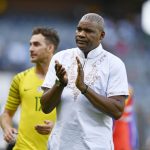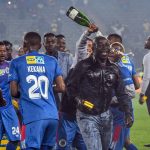The making of SuperSport United’s double act
Midfielders Teboho Mokoena and Sipho Mbule from the Harmony Academy in Virginia complement each other on and off the pitch, with one bringing discipline and the other creativity.
Author:
12 February 2020

Two stories about one of the brightest footballing duos in South Africa in some time, SuperSport United midfielders Teboho Mokoena and Sipho Mbule, neatly encapsulate how exciting they are as young talents.
Mokoena and Mbule basically grew up together in the Free State, in Bethlehem’s main township of Bohlokong. Pitso Mokoena, the head of Harmony Academy in the Free State mining town of Virginia near Welkom, spotted his teenage namesake at a junior tournament. The manner in which the coach spotted Mbule is a classically South African football tale.
“Teboho, I saw in a Coca-Cola tournament in Bloemfontein, playing for his school,” says Pitso Mokoena, the late 1990s Free State Stars player who now heads the academy started by Bafana Bafana coach Molefi Ntseki.
Related article:
“For Sipho, it was different. I was travelling one weekend to my home in QwaQwa from Virginia, which takes you through Bethlehem. I saw a game on at Goble Park [stadium] and said, ‘Let me just take 10 minutes here.’ In that 10 minutes, I saw Sipho. I went to his coach, got the number and left.
“On Monday, I followed up for Sipho to come on trial when the schools closed. Everything happened from there. In that 10 minutes I saw this kid smaller than the others, I saw what I needed.”
Teboho Mokoena, 23, and Mbule, 21, who have known each other since their days playing school football, display a telepathic understanding and complement each other’s contrasting styles. Together with national stalwart Dean Furman, the three midfielders are the cogs in Matsatsantsa a Pitori, the team that won this season’s MTN8 and are chasing the Absa Premiership. The three of them are a solidly built combination under coach Kaitano Tembo, himself an ex-SuperSport defender.
Mokoena earns respect
Furman tells the second story, the one about Mokoena and the way the slightly cocky, more mature midfield playmaker burst into training at SuperSport just before he exploded on to the scene. His debut came in October 2016, a year ahead of Mbule’s in August 2017.
“Tebza broke into the first team and I’ll always remember his first day of training,” says Furman. “He came in, got the ball and put one past Ronwen Williams from about 30 yards out. It was a moment where we looked at each other and thought, ‘Wow, who’s this kid?’ Normally kids coming in keep it simple, don’t want to make a mistake. He just said, ‘No, I’m going to show them what I can do’.
“Tebza has grown as a player. And there’s loads more of him. He’s a good size, runs with the ball. If you look at the goal he set up [for Bradley Grobler, with a run and cross] in the MTN8 final, he can stride. He’s got long legs with the ball. He creates and scores goals. So he’s your stereotypical box-to-box midfielder. He’s working on the other side of his game without the ball.
Related article:
“Mbule’s definitely more skilful. I’m just happy other people are chasing him around now. Because for a long time when he wasn’t playing [first team], it was me chasing him in training every day. The skill he possesses, the way he sucks players in, can turn on a sixpence. That’s natural ability at its finest. He has the ability to roll players and this burst of speed to get away from you.”
In early November, Mokoena and Mbule are supposed to be training at the SuperSport ground at Megawatt Park in Sunninghill, Johannesburg. But as it’s the week before the Under-23 Africa Cup of Nations, they’re being shunted from medical to medical ahead of the tournament. It’s a heady time for the two of them.
Olympic qualification
The discipline they displayed in their game at Bidvest Stadium that following Friday was nonetheless superb. They limited their creative tendencies to fit in with Tembo’s rigid away-game plan against fellow title-chasers, the physical Bidvest Wits, helping SuperSport sneak a 1-0 win.
Mokoena and Mbule flew to Egypt the next day, beefing up David Notoane’s Under-23 side, an understrength team that faced Zambia in their opener and drew that game 0-0. Mokoena’s free kick – trying out a new technique of taking a few steps to the ball, having been watching Argentina and FC Barcelona captain Lionel Messi – earned the side a 1-0 win against Ivory Coast. And a draw against Nigeria followed by a penalties win against Ghana in the third place play-off saw the team qualify for the Olympics, meaning Mbule and Mokoena will play on a global stage in Tokyo, Japan, in July.
Mokoena is clearly the leader in the relationship, the more mature of the two. Mbule is the younger, not only in age but also with a reputation as having a mischievous streak.
“We grew up in Bohlokong. But Sipho was based in an area called Vuka. I was based in Loso,” Mokoena says. “We went to different schools. I knew him when I was growing up, he played for [amateur team] Alex, I played for Juveniles.
“I got scouted for Harmony from a Copa Coca-Cola Under-15 tournament in Bloemfontein in 2012. I was 16 when I arrived at the [Harmony] academy. Sipho was 15.”
Related article:
Mokoena had been turned away from Free State Stars’ development programme because “they told me I was too skinny to play for a PSL [Premier Soccer League] team”. He is an only child. He perhaps had it a bit tougher growing up than Mbule, whose parents are still together and whose dad runs small businesses around Bethlehem. It seems Mokoena has not forgiven his pro footballing father, former Stars and Hellenic defender Alexis Motaung, for his absence. Motaung died in 2010.
“I’m left with my mom and my granny and my cousins,” Mokoena said. “I’m basically the breadwinner, ’cause there’s no one working at home. Every month, I send them something for groceries.”
Strict academy regime
The daily regime of players who come up through football academies usually means they have had to sacrifice any thoughts of a carefree childhood.
Pitso Mokoena’s Harmony Academy, now called Virginia Sports Academy, was founded in 2003 with a football and rugby programme of 25 teenagers each and funded by Harmony Gold, a mine that operates in the area. At Harmony, Mokoena and Mbule woke up at 5am every weekday, were at breakfast by 6am and at school until 2.30pm, arriving back at the academy by 2.50pm.
“By 3pm, I want to start my training session,” Pitso Mokoena says. “By 4.30pm the training has to be finished because by 5pm, the boys are in the dining hall for supper. From 6.30pm to 8pm is study time, and from 8pm to 10pm the boys are free. Then, it’s lights out.
“It’s very hectic. As a footballer you need that discipline. Saturdays we play in the SAB league [fourth division] and sometimes also the schools league on Sunday.
“I’m proud of the boys because they understand why they are there. You explain that it’s not a punishment. Out of 25, one or two might go professional. But if they have grade 12 and this discipline of being on time for breakfast, training and so on, they can make it in life, too.”
Related article:
Mokoena and Mbule got the first inkling of their potential while helping Harmony beat English Premier League team Swansea City’s juniors 3-1 at the Under-19 Bayhill Premier Cup in April 2015. It was during junior tournaments like this that SuperSport noticed the two players.
“We play friendly games against SuperSport in the Free State, in Joburg,” Pitso Mokoena said. “I have a relationship with their youth coaches, Kwanele Kopo [Tembo’s assistant] and Godfrey Mosoetsa … Actually, SuperSport saw them in the Engen Champ of Champs, at Tuks [the University of Pretoria]. We arranged for them to go for an assessment. SuperSport were happy.
“They started to play MultiChoice [Diski Challenge, the PSL’s reserve league] while still in our programme. They stayed in Virginia. On weekends, after school on Friday, they would travel to Pretoria, play MultiChoice and come back.”
Mokoena has remained a step ahead of Mbule so far. He made his Bafana Bafana debut, scoring off the bench in a 6-0 Africa Cup of Nations qualifying win against the Seychelles at FNB Stadium, in 2018. He was granted his debut by then national coach Stuart Baxter, who introduced Mokoena to the PSL at SuperSport. Many felt Baxter might play Mokoena at last year’s Nations Cup in Egypt.
Mbule announced himself by playing his part when SuperSport reached the 2015 CAF Confederation Cup final. He drifted off the radar a bit, with question marks hanging over his ability to finish a game. His Absa Premiership Player of the Month award for October displayed his revitalised form in 2019-2020.
SuperSport’s youth brigade
Another promising youngster in the team is Jamie Webber, 22. Furman, Webber, Mokoena and Mbule push each other in that Matsatsantsa midfield, with the two from Bethlehem habitually raising their game when the other makes strides.
“They’re all driving each other,” Furman said. “I said to Sipho last year, ‘Look at Tebza, look at your friend. He’s playing for Bafana Bafana, he scored against Seychelles. What are you doing?’ And Sipho’s taken it upon himself to get into fantastic form this season, really making a name for himself.”
Pitso Mokoena saw from a young age that it was not just Mokoena’s age that put him ahead of Mbule, it was also his mentality. But watch Mbule, the academy coach says.
Related article:
“Teboho is a very disciplined, coachable boy. He’s not got a lot of fancy things in his feet. He’s different to Sipho. Sipho can surprise you,” Pitso Mokoena says.
“Even before Teboho broke through, I was saying to a lot of people, even you guys in the media, when you phoned me, that I was still waiting for this boy by the name of Sipho. I want to be honest and Sipho knows this, Sipho can surprise you. But I don’t trust Sipho when it comes to discipline.
“That’s the only thing that has delayed him breaking through. Teboho broke through because of simple things. Sipho is the boy who easily runs out of patience. Unless now he has made his breakthrough and wants to mature. But talent-wise, I believe Sipho is ahead of Teboho.”
Pitso Mokoena encouraged Teboho Mokoena to take the leadership role for his friend.
“When Teboho broke through, Sipho was frustrated at not playing. When I talked to them regularly, I would say to Teboho, ‘The more you play, the more he might feel that you don’t want to talk to him or be friends any more. So pull him close to you and say his chance will come.’ And fortunately, I think it worked.”
Fortunately for South Africa, too. They’re good kids, exciting talents. And the country will be given much pleasure from these two.





